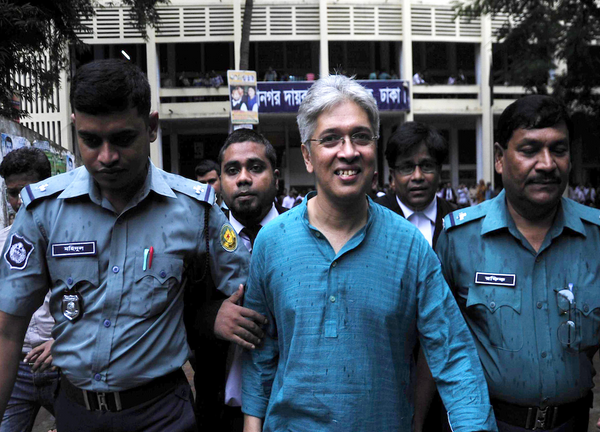Killing the messenger
Bangladesh government’s decision to shut down a leading human rights organisation involves considerable self-harm.

It is entirely in character for the current Bangladeshi government, responsible for hundreds of extrajudicial killings and enforced disappearances, to try and close down the leading organisation within the country which has documented and brought these very incidents to light.
As has been widely reported, on June 5th 2022, the government’s NGO Affairs Bureau, which is directly supervised by the prime minister’s office, wrote to Odhikar informing the group that the bureau had cancelled its registration.
Odhikar is not the only Bangladeshi human rights organisation to document killings and enforced disappearances in the country. But they are by far the best.
The reputed rights group Ain-o-Salish Kendra also documents and investigates human rights violations — but this work is just one of the many human rights activities it undertakes. For Odhikar, documentation has been a key programme.
As a result, the group’s work is head and shoulders above other Bangladeshi organisations, and is relied on by many journalists and international human rights organisations who, through their own inquiries, have corroborated and found its information to be reliable.
It does not, as the government claims, produce “falsified and fabricated information and concocted stories of human rights abuses”.
It may well be the case, as the government repeatedly asserts, that over 16 years ago, when the opposition Bangladesh Nationalist Party (BNP) was in power, Odhikar’s secretary, Adilur Rahman Khan was for a period of time a member of the attorney general’s office. Yes, it is true that ideally one would not want people with a past or current partisan political background to be involved in human rights organisations. However, what is important is that Odhikar, as an organisation, continued to document accurately the human rights violations of the BNP government at that time.
And this is one key reason that the current Awami League government wants to close it down. In the context of Bangladesh’s human rights situation, Odhikar is a truth-teller. And that is something the government cannot stomach. This is why there has been a sustained attack on the organisation, going back to 2013 when the police arrested Khan for publication of a human rights report which the government disputed.
There is also the issue of retribution.
The government wants to punish Odhikar for the role it believes the organisation played in the imposition of US government sanctions against Bangladesh’s notorious special police unit accused of summary killings, the Rapid Action Battalion (RAB), and a number of its former and current officers, one of whom is the current head of the Bangladesh Police.
While one should not overplay the significance of the US sanctions, it is nevertheless clear that they have struck hard at the government. The government’s ability to control the narrative — achieved through censorship of the media, repression of the opposition and removal of independent institutions — has been struck a serious blow. It has lost its sense of immunity. And the government would like to punish those responsible.
There was a long chain of people and organisations involved in the process before the US government decided to impose sanctions. Notably, it started off with the Bangladeshi politicians and the senior law enforcement officers who allow extrajudicial killings and disappearances to take place, and the law enforcement and officers who carry out their orders. Without them, there would be no sanctions!
But the chain also involves the journalists who report them, local human rights organisations who investigate and document them, international groups who undertake their own inquiries into them and diplomats who verify them.
And within that chain, Odhikar no doubt played its role — and the government cannot forgive them.
It is notable, that at the same time the government is very happy not only to forgive those who actually carry out the killings and disappearances, but to promote and reward them.
Look no further than the promotion of the current Inspector General of Police (IGP) Benazir Ahmed from his position as head of the RAB, when under him hundreds of these incidents took place After the sanctions, he still remains in post, not criticised by anyone within the government. And then there are the two senior police officials who, a little over a month after they were individually sanctioned for their previous role in RAB, were rewarded with police medals for “their bravery and service to the country in 2021".
Forgive the criminals. Punish the messenger.
Perhaps one should not over-psychoanalyse a country’s government, but the decision to seek to close down Odhikar seems one that involves a significant level of self-harm.
Sure, this decision may well hit Odhikar, though perhaps in the end far less than the government imagines. Its reputation will continue to grow. The decision is more likely to hurt the government far more. Look at the overwhelming critical responses from the international community — from the United Nations to the US government. The government’s future beyond the end of next year depends a lot on being able to persuade these very people that the 2023 elections, whatever kind of vote ends up taking place, will be “free and fair”.
Closing down a human rights organisation, which the UN and the US government know well to be a credible source of information, is a clear indication that free and fair elections are very far from the government’s mind right now.
And the international community hears this loud and clear.●
David Bergman (@TheDavidBergman) — a journalist based in Britain — is Editor, English of Netra News. He also runs the bangladeshpolitico blog